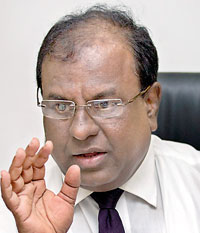News
‘Operations Room’ to monitor city and suburbs of Colombo
A wide-ranging garbage collection and disposal programme covering the whole country is being floated immediately with a special ‘Operations Room’ being set up to monitor the situation in the city and suburbs of Colombo, a top official disclosed yesterday.

Provincial Councils and Local Government Ministry Secretary: Kamal Pathmasiri
The programme will come under the high-level Task Force based at the Provincial Councils and Local Government Ministry with many relevant stakeholders being part of it, ministry Secretary Kamal Pathmasiri told the Sunday Times.
This Ministerial Task Force has drawn together stakeholders such as other line ministries, the armed forces and the police, the private sector and chambers such as the Chamber of Commerce, it is learnt.
“It is vital to have the input of all,” said Mr. Pathmasiri, citing the example of the need for the Fisheries Ministry to give a plan on how to deal with garbage on boats and at fisheries harbours.
All nine provinces will have Waste Management Plans, he said, conceding that the dengue epidemic and garbage disposal are inter-linked to a certain extent. Sri Lanka has a National Policy on Waste Management, but it needs to be updated.
Explaining how the ‘Operations Room’ set up in the ministry with the participation of the tri-forces, the Environmental Police and representatives of the local government bodies will function, Mr. Pathmasiri said that it will follow the garbage collection schedules and routes in Colombo and its suburbs through GPS mapping. If there is a crisis in an area, trouble-shooting will be done on-the-spot.
This is in the light of Colombo and its suburbs being the worst-affected by the current dengue epidemic. It is a pilot project with the aim of ultimately being handed over to the individual local government bodies, it is learnt.
Under the garbage collection and disposal programme in the nine provinces, there will be strict segregation (based on the 3R system – Reduce, Re-use and Recycle) being enforced by all 335 local government authorities. This is while the authorities are planning to introduce waste management based on Japanese technology in about two months, he said.
“Several places, about 30, have also been identified for the disposal of waste and all scientific studies and environmental impact assessments will be done to the letter,” he said, pointing out that the sanitary landfill in Dompe can accommodate 90 tons per day.
Referring to Muthurajawela as a garbage dumping site, he assured that it is being studied for non- degradable waste, with the scientific aspect being handled by technical experts such as the Engineering Design Centre of the University of Peradeniya. “We will follow the due processes,” he said.
When asked how households should handle their garbage, Mr. Pathmasiri said degradable stuff should be collected separately, as also plastic, polythene, paper and glass, all of which should be handed over in segregated form to the local government bodies. Pampers and sanitary towels should handed over separately.
Meanwhile, there is a scheme at the Central Environmental Authority to collect electronic waste, it is learnt.

